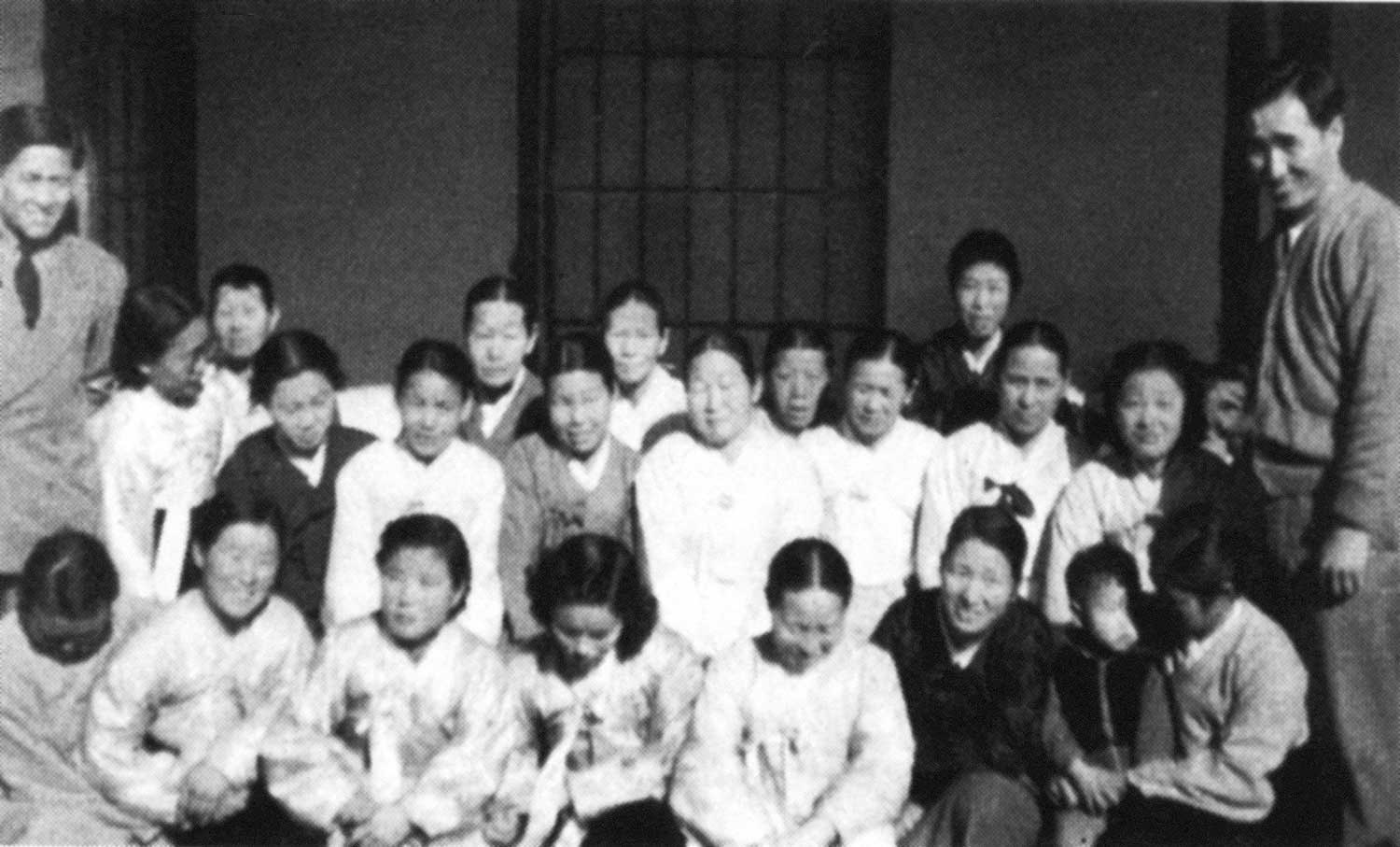Father was a war refugee in Busan in the early 1950s, yet his focus was quite different from the usual focus on personal survival that characterized refugee life.
His extraordinary vision for the world despite his circumstances at that time attracted some scorn, but it also attracted new members among the pure hearted and the prepared.
When I began working to establish the church, I used to beg for food. I was in terrible circumstances, but I wasn’t ashamed. From the position of knowing Jesus’ will, I knew that I would fulfill my mission to teach our central principles for the sake of the future, which in turn would ignite a fire in the hearts of countless young people.
During the early days, I led a single church. From that beginning, I gathered a few members and had them visit spiritually prepared people all over the nation. Among them was Missionary Kang Hyun-shil, whom I sent to Daegu.
Before she met me, she had been the young lady responsible for the Beomil-dong Tent Church. Other than that church, there were only Buddhist temples in the Beomil-dong valley.
She heard a rumor that an unusual young man was living in a house at the very edge of town, so she came to witness me. That is how I met her, and God worked through that. She came looking for me every day. After some time, she decided to leave her tent church and join our church.
The earliest pioneer witnessing efforts
With that condition, I sent her to Daegu to witness. I sent her to Daegu because that region was like the Jerusalem of South Korea. I sent her out empty-handed.
There was a reason that I sent her out to witness without even giving her money for a train ticket.
It was because in those circumstances the spirit world was compelled to help her. When she arrived in Daegu, she had no place to go. So the spirit world guided her to meet someone who was prepared. That is how the Daegu church began.
I told Missionary Kang Hyun-shil, “Go to Daegu as a pioneer witness!” When she first went out pioneering, she cried as she witnessed.
Then God confided to her, “You have just arrived here, and you are crying, but I have worked for thousands of years while harboring bitter pain.” She had been about to leave, but after hearing God’s voice, she decided to stay and endure.
When I think about it, God didn’t listen to anything she had to say about her situation. He just told her to pioneer and witness to people. Given those circumstances, when I sent her to a certain place on my behalf, someone was waiting for her with tickets for her transportation, and further along the way, another person was waiting with a meal prepared.
When you go witnessing, it will do you no good to just sit down and worry. It is not a mission you can fulfill with money; you have to make conditions of sincere devotion. On that foundation, if you pray sincerely, God will guide you. Further, if you work hard until your feet get sore and blistered, God can work through that.
Kang Hyun-shil went to the center of Daegu for pioneer missionary work without knowing anyone there. Did anyone welcome her? How hard it must have been for her when she was wandering around on the streets. She was lamenting about her hard luck and praying, “O Lord, where should I go?”
And God said to her, “Are you complaining after just one day? You are far from reaching the heart of your Father, who has suffered for thousands and thousands of years!” He meant that she had to go through more hardships. It is difficult to meet God or to find the Will of God.
Persecution in Daegu (first visit, early December 1953)
What always comes to mind when we speak of the history of the Unification Church in Daegu? It was the place of the most intense and severe persecution.
If a place can be said to have rendered a “distinguished contribution” in opposing the Unification Church, the number one place in this respect is Daegu, located in the middle of Gyeongbuk Province.
When I walked the streets, I did my best to take the backstreets, the deserted streets, as a sinner who was not a sinner. It wasn’t good for me to meet anyone. Everybody knew me in the backstreets there.
The established churches would show my photograph to everybody, so wherever I showed my face, people used to shout, “There he is! That Mr. Moon is here!” There was such a commotion.
When the established churches learned where I was, they used to guess that I would be staying near one of the local churches, and from that church, they used to blow a trumpet every day, shouting, “Kick out the heretic monster!”
They caused such a commotion that the whole city was murmuring against me, wanting to expel me. It got so bad that I couldn’t go anywhere in the daytime.
Daegu was the gung-ho headquarters of the established churches. The Che-il [First] Church ministers were at the core of those opposing the Unification Church. There was Deaconess I'm’s son-in-law. The world is very strange; his mother-in-law was attending our church, but he was extremely active in opposing it.
I have a lot to say about the city of Daegu. The reason I was able to survive and endure such extreme persecution was because I had such an unchangeable, earnest desire and hope.
What was the aim of that hope?
It was to realize God’s nation, guaranteed by God, which He had been trying to restore throughout the ages. This hope has also been that of countless religious people throughout history.
The land deserves to be cursed, but didn’t God order Jonah to warn Nineveh?
However, Jonah went away, hoping for the destruction of Nineveh, and God cast him into the sea. I experienced the love of God, who had caused Jonah to be swallowed by the whale.
I was young with the strength to say to God, if He were to tell me that He was going to destroy the city, “Heavenly Father, please forgive them just one more time. Furthermore, I will restore this city for You.”
Eu Hyo-won was born in Busan (December 24, 1953)
The admirable thing about President Eu was that he made notes of the whole of the Principle and shed countless tears with every page.
Because he was an intellectual, as intelligent as a university student, he had tired himself out searching for the truth, so when he came, by chance, to know this deep reality, he didn’t just shed one or two tears; it was like a waterfall.
The rapture you feel when you come near to the truth cannot be recorded without shedding tears. I heard that it took him a week to copy down one page of the Principle. So you can imagine how much he must have cried.
The words of truth which could relate to the original mind have the power to make love explode in your heart and then explode again and that explosiveness continues.
President Eu’s strong point is this: Even without having heard me speak, just from reading the Principle, by himself, he stood with gratitude and pledged to become an eternal offering in front of Heaven. When I was lonely, I met that kind of person. This was God’s work.
When did President Eu join the church? In 1953. That was the same as subjugating and restoring Cain from the satanic, Cain world …. That’s why I set him up as the representative. Although God knew that he was physically disabled, I made him the leader, and we started from there.
President Eu was six years older than I was. John the Baptist was six months older than Jesus. From the Principled standpoint, I had to think of him as being in John the Baptist’s position. I started the Unification Church with President Eu.
In 1953, I began a seven-year course to make a fresh start in 1960. During those seven years, I set up all sorts of conditions. In the early days, we had churches in three places: Busan, Daegu, and Seoul.
Those three churches had to become one with me, and on the foundation of that unity, I had to proceed to fulfill indemnity conditions. I had to resolve Jesus’ grief and resentment. Without doing this, restoration could not occur.




